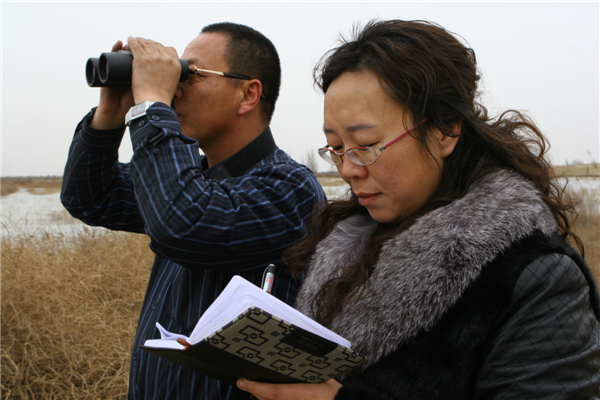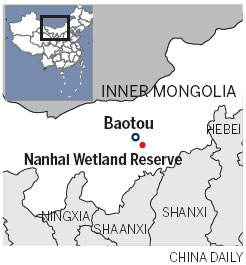 |
|
Miao Chunlin (right), head of the protection station of the Nanhai Wetland Reserve, gathers bird migration data. Provided to China Daily |
Catastrophe
In 2004, a China Eastern Airlines plane crashed into the lake shortly after takeoff from Baotou airport, causing the deaths of 55 people. The accident also spelled an environmental catastrophe for Nanhai; leaked engine oil resulted in the quality of the water plunging below category V, the most severe pollution level.
"The planes soon resumed flying overhead, but the devastated waters were left. We were close to the end of our world," Miao recalled.
Yu Wei remembers the incident, which happened less than 12 months after he took over as director of the reserve's management committee.
"People gathered to search for victims, but few cared about the water and the birds, both of which were greatly harmed."
 With a grant of nearly 300 million yuan ($48.7 million) from the municipal government, and compensation of 33 million yuan from China Eastern Airlines, the park endeavored to recover the ecosystem. Clean water was fed into the most polluted part of the lake - roughly 10,000 square meters - and new, non-polluted mud was added. Meanwhile, spiral shells, waterweeds and mud-dwelling creatures were introduced to replenish the environment. The park reopened in 2007.
With a grant of nearly 300 million yuan ($48.7 million) from the municipal government, and compensation of 33 million yuan from China Eastern Airlines, the park endeavored to recover the ecosystem. Clean water was fed into the most polluted part of the lake - roughly 10,000 square meters - and new, non-polluted mud was added. Meanwhile, spiral shells, waterweeds and mud-dwelling creatures were introduced to replenish the environment. The park reopened in 2007.
In 2008, Inner Mongolia passed the Nanhai Wetland Natural Reserve Protection Rule, the region's only law designed to supervise a specific nature reserve.
"The legal system is the most important aspect. Some work can only be processed through laws," said Yu. "The province-level rules can offer guidance for the work in general, but our own rules are more pragmatic."
The quality of water has regained its category III status and the variety of bird species is now more abundant than before the accident. Only 77 species were discovered in 1992, but the number has now reached 201, although Miao concedes this could be due to more-stringent observations.
"If not for the plane crash, people might not have paid any attention to protecting this wetland," said Miao. "However, once things returned to normal, it again became difficult to attract attention. We are like monks begging for meals, just to get more funding."
Funding conundrum
Funding is a big problem for Nanhai, whose annual revenue is in excess of 7 million yuan. Half of that sum is spent on wetland protection, which leaves little cash available for new projects, let alone expensive testing equipment for the labs.
The team moved into a two-story office in 2011. The second floor houses a photo gallery of birds along the Yellow River. As Miao explained, the popular science angle is crucial to the wetland's survival: "If we don't let the public know what we are protecting, why should they pay attention to us?"
Gasoline is in limited supply, so the teams patrol the wetlands on bicycles, and the computers in the office don't even have access to the Internet.
However, the biggest problem is a dispute with local residents concerning 200 hectares of land. Although villagers don't live inside the boundaries of the reserve, some of the land includes fields that have been cultivated by locals for generations.
"When we asked the villagers to return the land and leave more room for the birds, they argued that the constitution promises them the right to live, and they can't live without the land," said Yu, who formerly worked at the municipal law office.
"Cultivating this land is difficult because it's often flooded, but we understand the ancient agricultural traditions that make farmers reluctant to leave their homeland.
"The only solution is to compensate the villagers, which may cost tens of millions of yuan. Do you think that's possible in our position?" he asked.
|
|
|
|
|
|
|
|
